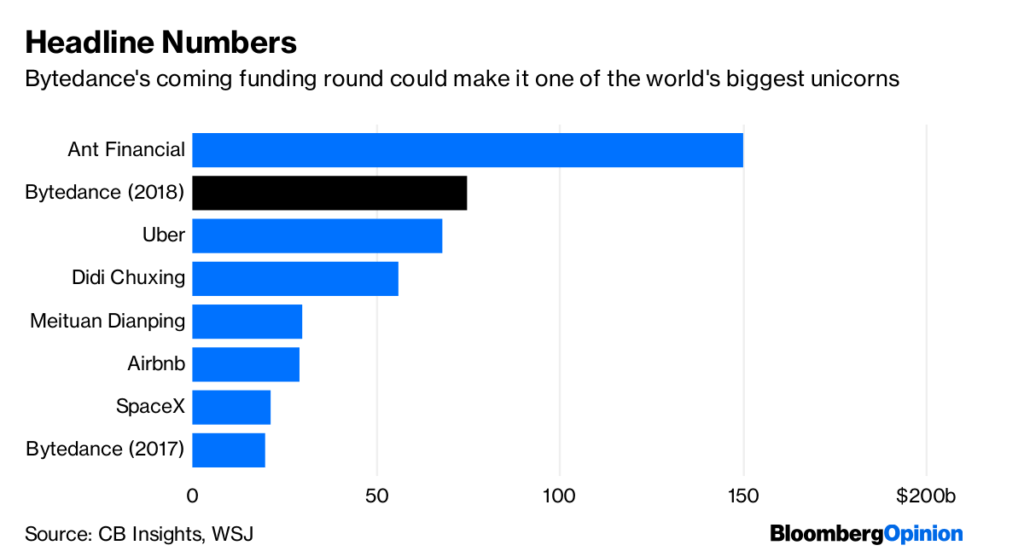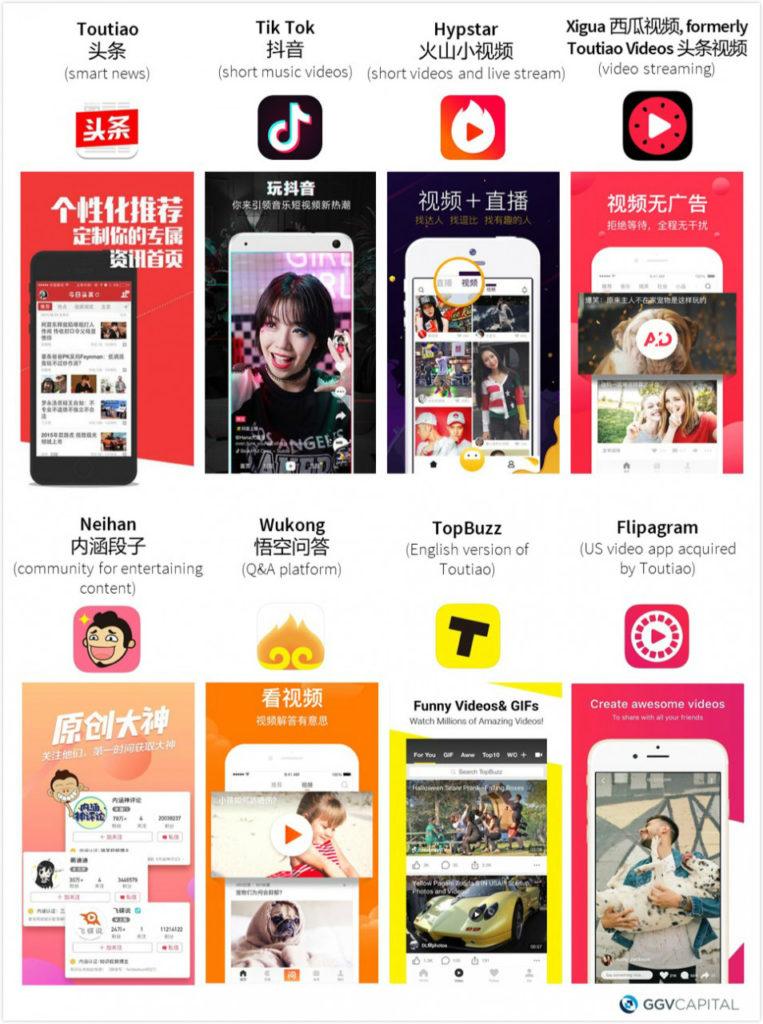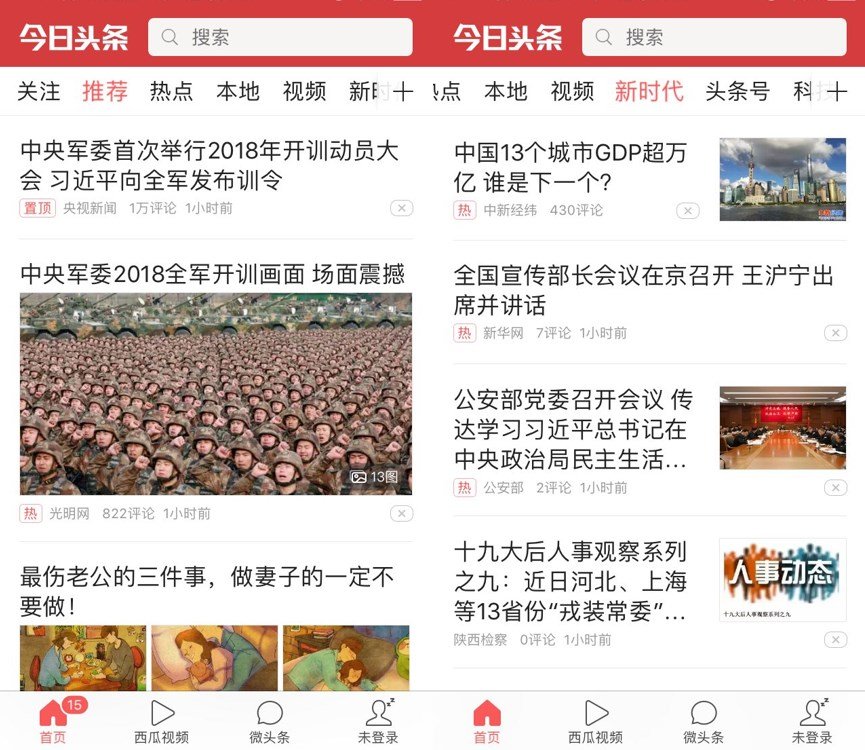Bytedance’ AI application: secrete sauce behind the world’s most valuable private startup

Explore what's behind the world's most valuable tech startup
Chinese Bytedance became the world’s most valuable private tech startup
In October 2018, news leaked that Bytedance, the Chinese parent company behind the news aggregator app Toutiao and short-video platform Douyin (or TikTok, known outside of China), among a dozen other mobile content apps, closed a latest funding round of $3Bn, from a group of investors including Softbank, KKR, General Atlantic. The post-money valuation of ~$75Bn USD made it surpass Uber to become the world’s most valuable private tech startup. With a suite of “super apps”, Bytedance has a combined monthly active users (MAU) of 1.3Bn worldwide and was projected to generate $70Bn USD of revenue in 2018. Despite the achievement, Bytedance was only six years old. The question is: how did it do that?
How Bytedance started
In 2012, Zhang Yiming, a locally trained engineer and serial entrepreneur started Toutiao, a news aggregator app that scrape news from the internet and push to people “based on their interests”. When explaining the business, Zhang Yiming told investors that Toutiao’s recommendation algorithm was powered by artificial intelligence (AI) and machine learning. The CEO emphasized that Toutiao was not a news company, but an AI company in the search business or social media business. At the time, most investors were skeptical, as they believed the news recommended by Toutiao were no different than major online news portals.
Toutiao’s AI powered business model
However, things quickly started to change. 90 days after the launch, Toutiao attracted 10 million users to its platform. With a laser focus on mobile, Toutiao took advantage of the smart phone penetration and partnered with smart phone manufacturers to pre-install the apps. Once consumers opened the app, they tend to stay because Toutiao would keep pushing content to them based on consumers’ prior browsing behaviors (what kind of content they liked and how long they spent on each news piece). With an easy and friendly interface, one can keep scrolling the app and reading news recommended to yourself. Because Toutiao used artificial intelligence algorithm to select and push the news, the company did not hire a single reporter or editor. As a result, the business model was extremely capital-light and salable. Toutiao makes money through advertising by inserting an add every three or five pieces of news. The larger the user base, the more data generated to optimize Toutiao’s algorithm, the more accuracy content and ad were distributed to the consumers, allowing Toutiao to create two virtuous cycles for both consumers and advertisers on the platform.
Thanks to the addictive content, users spent increasing long time on the App. An active user typically spent more than 60 minutes a day on the platform, only second to Tencent’s Wechat, a social network app for everyday communications. By the August 2016, Toutiao‘s daily active users (DAU) surpassed 60 million, with total users of over 550 million. During 2016, Toutiao also aggressively encouraged content generators such as writers, news reporters and KOLs to set up their accounts on the platform. Leveraging its huge user base, Toutiao shared revenue with the content generators similarly to Youtube, to attract exclusive content and further building its competitive moat.
From one app to multiple apps, from China to global
In late 2016, Bytedance launched Douyin, a short-form video app that allowed people to upload 40-second self-made videos. Leveraging its existing user base and the algorithm infrastructure, Douyin was able to identify popular videos and push to users who may like them, based on their previous interests / browsing pattern. In two years, Douyin (and its overseas version TikTok) quickly became world’s most down loaded app, attracting DAU of 100 million domestically and DAU of 400 million overseas by late 2018.
Douyin’s success proved that Bytedance’s AI powered business model can be replicated in various content categories. In 2017-2018, Bytedance launched a dozen content apps spanning live streaming, Q&A forums, jokes, funny videos, and auto news, etc. It’s user base and ad revenue continued to grow.
Short-term challenges
Along Bytedance’s journey of incredible growth, the company has been repeatedly excoriated by authorities for failing to filter content that were sexual or violent or simply fake news and been forced by the government to clean up its services with alarming regularity. In respond to that, Bytedance started to employ a large team of editors to filter and censor content to comply with authorities.
Long-term challenges
With Bytedance’s rise, it is driving intense competition both domestically and overseas. Bytedance’s advertising business model is taking market share from other tech giants such as Baidu and Tencent in China as well as Facebook overseas. These tech giants quickly rolled out similar apps to compete with Bytedance. In addition, the consumer-centric nature of Bytedance’s business means it ultimately competes for user spare time, which is limited. Management currently address these issues by creating innovative and differentiated product features. Going abroad to under-penetrated markets was also another strategy that the management is currently adopting.
Other steps to take
Instead of staying in content business and focusing on end consumers, Bytedance could explore enterprise opportunities where they could export their AI capabilities to enterprises who could better serve their clients with enhanced efficiency and better customer knowledge. The addressable market opportunity for the enterprise business is even larger.
Open question
As Bytedance grows bigger and bigger, we need to ask what kind of real value it creates for the society? Is it healthy for users to spend that many hours on a dozen of apps, whose purposes were to feed the information (usually sensational) to keep the user stay on the platform to generate ad revenue?
(796 words)
Citations
Zhong, R.(2018) China’s King of Internet Fluff Wants to Conquer the World [online] NY TIMES.
Available at: https://www.nytimes.com/2018/10/29/technology/bytedance-app-funding-china.html
Chen, L.(2018) 35-Year-Old Unknown Creates the World’s Most Valuable Startup [online] Bloomberg.
Available at: https://www.nytimes.com/2018/10/29/technology/bytedance-app-funding-china.html
Russel, J.(2018) China’s ByteDance leapfrogs Uber to becomes world’s most valuable startup [online] Techcrunch.
Available at: https://www.nytimes.com/2018/10/29/technology/bytedance-app-funding-china.html
Chen, M.(2018) In Depth: Upstart ByteDance Takes On China’s Internet Goliaths [online] Caixin Media.
Available at: https://www.caixinglobal.com/2018-11-11/in-depth-upstart-bytedance-takes-on-chinas-internet-goliaths-101345485.html







It’s a great question Peter. I often think about how social media apps here are basically driven to just keep users on them for as long as possible. I also find it interesting that Instagram now shows users how long they have spent on the app, which in a way suggests that they know it may be detrimental to stay on the app. Thanks for sharing!
Bytedance’s success is really impressive. The first thing I thought about was potential privacy concerns. If apps are pre-downloaded on to smartphones, consumers do not necessarily have a choice in whether their browsing behaviors are tracked. I think that this is an important consideration in answering the question of whether Bytedance creates value or harm for society.
I agree with you, Peter, on the question on whether social media apps like Toutiao/Bytedance ultimately create or destroy value for users and society if their ultimate goal is to make us spend more hours on their platforms. I think most users had unconsciously trapped into the additive nature of the apps that is fueled by machine learning. With regards to the proliferation of fake news on social media platforms, I wonder if Toutiao/Bytedace has thought about using machine learning or other mechanisms to filter out contents that are fake or sexual/violent.
Peter, you have raise a very good question, does social media platform has any social responsibility to consider health factor and to stimulate learning experience of the society or it’s all about revenue? In my opinion there is supply and demand effects here, for many of us is about self-discipline. However, where I do think social media should take responsibility is when this become epidemic impact to young adults and children. Especially when fake news, sexual and violent contents are not censored. With Machine Learning, a lot of times these contents are recommended instead censored.
Great work, Peter, thanks for sharing!
I was first struck by Bytedance’s shrewd business decision to partker with smartphone manufacturers to pre-install the apps. This allowed them to greatly expand their userbase and develop the dominant position.
I agree that there is potential to use this AI capability for more societally beneficial means in an enterprise setting, but I wonder if more educational content is actually best recommended using the same features the algorithm currently uses for entertainment content, or if you’d need to develop new variables.
The fact that they are employing human editors to track sexual/violent content shows how far AI still has to go before it can be 100% trusted. But I applaud Bytedance and all they’ve accomplished so far!
I agree with the quality or compliance issue too. I remembered that Tik Tok was once banned in some Southeast Asia countries. As the business growing so quickly, there is a huge compliance or culture risk of harmful contents.
Another opportunity for Tik Tok’s commercialization might be to create a social e-commerce model. For example, many Alibaba sellers already started to sell products on Tik Tok.
Thank you for this Peter – super interesting.
One concern I have is the manual content editing they are going through. As you continue scaling, I believe that Bytedance should find a more efficient way to filter the content. On the other question, I do think that spending too much time on Apps is harmful, but this is their business model and I don’t believe any tech company would like to change this behavior. I believe people should be aware of what content they are consuming and be their own filter.
Other than that, great piece.
Thanks Peter for sharing this. To your point of creating social values, I think Bytedance is creating social value in a way that it provides both news information and entertainment for its customers- which is essential needs of human being. However, the question is how much of those are healthy and how much would cross the line as being addictive. Another question would be how Bytedance can explore other ways to generate revenue than merely relying on the advertisement- otherwise their incentive would always be to get users to stay online as long as possible.
Peter, this is a great article! Thanks for sharing!
For me, a more philosophical question is how does the platform help to form a well-rounded view to a person? If it only shows what you like, that means it will be biased significantly and ultimately person would not develop herself (ie only one political view, only one part of the story biased based on journalists opinion etc). I think it is the most scary part of AI – the moment when you don’t even realise that the news feed is just tailored to your preference, but you like it so much that you don’t bother to go outside and ask for other news/opinions etc.